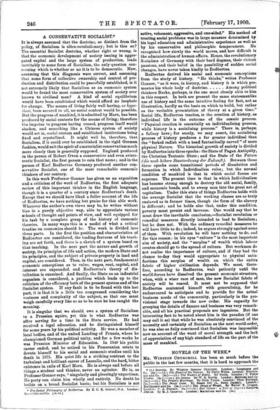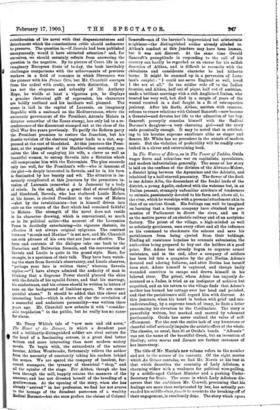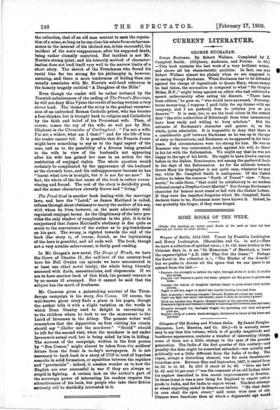NOVELS OF THE WEEK.*
Ma. WINSTON CHuacRILL has been so much before the public in the last few months, that it is hard to approach the • (1.) Savroia. By Winston Spencer ChurchilL London : Longman and Co. [6e.]—(2.) The Heart of the Dancer. By Percy White. London : Hutchin- son and Co. [68.]—(3.) The Waters of lidera. By Oulda. London : T. Fisher Unveil]. [es.]—(4.) An Octave. By W. B. Norris. London : Methuen and Co. [68.3—(5.) The Priest's Marriage. By Nora Vynne. London i Thoa-Burleigh. [6s.]—(6.) The Final Goal. By Bessie D111 (L. Beith London : Hutchinson and Co. [6e.]—(7.) The Dregs of Wrath. By Walter E. Grogan. London : C. A. Pearson. [6s.] —(S.) Ben Comee : a Tale of Powers's Rangers, 1758,65. By M. J. Canavan. London Macmillan and Co. [6s.] consideration of his novel with that dispassionateness and detachment which the conscientious critic should endeavour to preserve. The question is,—if Savrola had been published anonymously, would it have attracted attention ? and, for ourselves, we should certainly refrain from answering the question in the negative. By its picture of Court life in an imaginary European State of to-day, the book inevitably challenges comparisons with the achievements of previous workers in a field of romance in which Stevenson was the pioneer with his Prince Otto, but Mr. Churchill emerges from the ordeal with credit, even with distinction. If he has not the elegance and urbanity of Mr. Anthony Hope, he wields at least a vigorous pen, he displays a genuine rhetorical gift of expression, his characters are boldly outlined and his incidents well planned. The scene is laid in the capital of Laurania, an imaginary Republic with a seaboard on the Mediterranean, where the autocratic government of the President, Antonio Molara. (a. dictator somewhat of the Roses stamp), has only led to a re- crudescence of the discontent stamped oat at the close of the Civil. War five years previously. To pacify the Reform party the President promises to restore the franchise, but his drastic revision of the electoral register leads to a riot, sup- pressed at the cost of bloodshed. At this juncture the Presi- dent, at the suggestion of his Machiavellian secretary, con- ceives the idea of employing his wife, a clever as well as beautiful woman, to entrap Savrola into a flirtation which will compromise him with the Extremists. The plan succeeds only too well, for the President's wife—who is innocent of the plot—is deeply interested in Savrola, and he in his turn is fascinated by her beauty and wit. The situation is im- mensely complicated at this juncture by the premature in- vasion of Laurania (somewhat a la Jameson) by a body of rebels. In the end, after a great deal of street-fighting and bloodshed, Savrola, who has sheltered Lucile Molara at his house, is elected President in the room of Molara —shot by the revolutionists—bat is himself driven into exile on the return of the fleet which had remained faithful to Molara. The strength of the novel does not reside in its character drawing, which is conventional, so much as in its political satire—the account of the Lauranian Press is decidedly entertaining—its vigorous rhetoric, its effective if not always original epigrams. The contrast between "morals and Maxims" is not new, and Mr. Churchill can coin phrases of his own that are just as effective. The form and contents of the dialogue take one back to the Disraelian and Bnlwerian formula, and the conversation of Savrola and Lucile is quite in the grand style. Here, for example, is a specimen of their talk. They have been watch- ing the stars from Savrola's observatory, and Lucile observes, " perhaps your fate is written there," whereon Savrola replies :—" I have always admired the audacity of man in thinking that a Supreme Power should placard the skies with the details of his squalid future, and that his marriage, his misfortunes, and his crimes should be written in letters of suns on the background of limitless space. We are conse- quential atoms." It should be added that this clever and interesting book—which is above all else the revelation of a masterful and audacious personality—was written three years ago. Mr. Churchill now submits it with "consider- able trepidation" to the public, but he really has no cause for alarm.
Mr. Percy White's tale of "new men and old acres," The Heart of the Dancer, in which a decadent poet
I and a brilliantly-distinguished soldier are rival suitors for the hand of a fascinating actress, is a great deal better written and more interesting than most modern society novels. To begin with, the antecedents of the actress heroine, Althea Westbrooke, fortunately relieve the author from the necessity of constantly taking his readers behind the scenes. We are spared the company of insolent, far- coated managers, the tyranny of theatrical " shop," and all the squalor of the stage. For Althea, though she has been through the mill, happily retains the manners of the amateur, and has not divested herself of the breeding of a gentlewoman. At the opening of the story, when she has already " arrived " in her profession, we find her not averse to the homage of the decadent poet—son of a wealthy Radical Baronet—but she soon prefers the claims of Colonel
Sanoroft—son of the baronet's impoverished but aristooratia neighbour—the distinguished soldier already alluded to Althea's conduct at this juncture may have been human, bat it was not discreet. At the same time Gerald Sancroft's promptitude in responding to the call of his country can hardly be regarded as an excuse for his selfish desertion of Althea, and is difficult to reconcile with the chivalrous and considerate character he had hitherto borne. It might be summed up in a perversion of Love- lace's couplet : I could not serve England so well, loved I the sex at all." So the soldier rode off to the Indian frontier, and Althea, half oat of pique, half out of ambition, made a brilliant marriage with a rich Anglicised Italian, who treated her very well, but died in a couple of years of the wound received in a duel fought in a fit of retrospective jealousy. After his death, Althea, smitten with remorse, refuses to renew relations with Colonel Sancroft—now become a General—and devotes her life to the education of her boy.
Sancroft promptly consoles himself with the Radical Baronet's daughter—a very charming girl—and the story ends prosaically enough. It may be noted that in attribut- ing to his heroine supreme excellence alike as singer and dancer, Mr. White has no precedent in the annals of modern music. But the violation of probability will be readily over- looked in a clever and entertaining book.
In The Waters of Edera, as in The Tower of Taddeo, Onida wages fierce and relentless war on capitalists, speculators, and modern industrialism generally. The scene of her story is laid on the confines of the division of the Abruzzo-Molese, a district lying between the Apennines and the Adriatic, and inhabited by a half-starved peasantry. The flower of the flock is one Adone Alba, the descendant of the feudal lords of the district, a young Apollo, endowed with the welcome but, in an Italian peasant, strangely unfamiliar attribute of tenderness to animals, passionately devoted to his farm and, above all, to the river, which he worships with a personal attachment akin to that of an ancient Greek. His feelings can well be imagined on learning that a foreign company have obtained the per- mission of Parliament to divert the river, and use it as the motive power of an electric railway and of an acetylene factory. The priest of the village, a high-minded as well as scholarly gentleman, uses every effort and all the influence as his command to checkmate the scheme and save his parishioners from being ejected from their holdings. Finding all resistance hopeless he counsels submission, the authorities being prepared to buy out the holders at a good price. But Adone has already begun to organise armed resistance, and in the end, after a company of soldiers has been led into a quagmire by the girl Nerina, Adone's devoted and adoring follower, and after Nerina has herself been shot, Adone himself is captured, and thongh badly wounded contrives to escape and drown himself in his beloved river. The priest, whom Adone has unjustly de- nounced as a Judas, is tried as an instigator of sedition but acquitted, and on his return to the village finds that Adone's mother has burned her cottage over her head and perished, and that the parishioners still regard him with distrust. At this juncture, when his heart is broken with grief and mis- understanding, by a supreme touch of irony, he finds a letter announcing his elevation to the Cardinalate. The story is powerfully written, but marked and marred by vehement partisanship. Onida has never realised the value of self- effacement. For the rest the entire lack of any humorous or cheerful relief seriously impairs the artistic effect of the whole. The classics, as usual, fare ill at Onida's hands. "Adonais" was not the name of the beautiful Greek, but an invention of Shelley; extra rnurus and Saracte are further instances of her inaccuracy.
The title of Mr. Norrie's new volume refers to- the number and not to the nature of its contents. Of the eight stories which An Octave contains, we find Mr. Norris at his best in that which describes the courtship of Lady Adisham, charming widow with a weakness for political wire-pulling, by a middle-aged Cabinet Minister and a pushing Under- Secretary for State. The scene in which Lady Adisham dis- covers that the ambitious Mr. Coxwell, presuming that his feelings are more than reciprocated by her, has actually per- suaded his middle-class fiancee to assent to the breaking-off of their engagement, is excellently done. The story which opens the collection, that of an old man content to earn the reputa- tion of a miser, so long as he can clear his estate from embarrass- ments in the interest of his idolised son, is less successful, the incident of the eon's reappearance, after his supposed death, being rather clumsily contrived. But incident is not Mr. Norris's strong point, and his leisurely method of character- isation does not lend itself very well to the narrow limits of a short story. The sketch of the Frenchman who found his racial bias far too strong for his philosophy is, however, amusing, and there is more tenderness of feeling than one tureally associates with Mr. Norris's well-bred reticence in the homely tragedy entitled "A Daughter of the Hille."
Even though the reader will be rather irritated by the Tbsenish nebulousness of the ending of The Priest's Marriage, he will not deny Miss Vynne the credit of having written a very clever book. The theme of the story is the gradual reconver- sion of an unfrocked Roman Catholic priest, who has become a free-thinker, but is brought back to religion and Catholicity by the faith and belief of his Protestant wife. Then, of course, comes the cry of the wife, so well put by Mrs. Oliphant in the Chronicles of Carlingford " I'm not a wife, I'm not a widow, what am I then ? " and for the life of him the reader cannot tell. It is possible that Sir Francis Jenne might have something to say as to the legal aspect of the case, and as to the possibility of a divorce being granted to the wife in view of the husband's not appearing after his wife has gained her case in an action for the restitution of conjugal rights. The whole question would certainly be complicated by the appearance of the husband at the eleventh hour, and his redisappearance because he has "learnt what love is to-night, but it is not for me now." In fact, the whole of the last scene of the book is rather uncon- vincing and forced. The rest of the story is decidedly good, and the minor characters cleverly drawn and " living."
The Final Goal is another book dealing with the marriage laws, and here the "Laird," as James Maitland is called, refuses through sheer obstinacy to marry the mother of his son, with whom he lives, however, on the most admirably well- regulated conjugal terms. Ae the illegitimacy of the hero pro- vides the only shadow of complication in the plot, it is to be conjectured that James Maitland's obstinacy is due quite as much to the convenience of the author as to pig-headedness on his part. The wrong, is righted towards the end of the book (the story is, of course, Scotch, so the legitimising of the hero is possible), and all ends well. The book, though not a very notable achievement, is fairly good reading.
In Mr. Grogan's new novel, The Dregs of Wrath, we have the Court of Charles II., the calf-love of the country-bred hero for Nell Gwynn (an episode we have encountered in at least one other novel lately), the whole being liberally seasoned with duels, assassinations, and elopements. If we are to have another book of this kind, the present venture is by no means ill arranged. But it cannot be said that the subject has the merit of freshness.
Mr. Canavan gives a painstaking account of the Ticon- deroga campaign in his story, Ben Coinee. Of coarse, the well-known ghost story finds a place in his pages, though the author tells it with a slight variation on the words in which Dean Stanley used to delight in recounting it to the children whom be took to see the monument to the Laird of Inverawe in the Abbey. The present writer well remembers that the Apparition on first visiting his cousin should say "Shelter not the murderer." " Shield " should be left for the second visit, when the murderer is not under Inverawe's actual roof, but is being aided by him in hiding. The account of the campaign, written in the first person by "Ben Comee," might almost be taken from the soldiers' letters from the front in to-day's newspapers. It is not necessary to hark back to a story of 1758 to read of hopeless assaults in solid formation, or squabbles between the regulars and "provincials" : indeed, it awakes wonder as to how the English are ever successful in war if they are always so stupid in fighting. A certain lack on the author's part of the sovereign power of interesting his readers impairs the attractiveness of hie book, but people who take their fiction seriously will be decidedly interested in it.








































 Previous page
Previous page